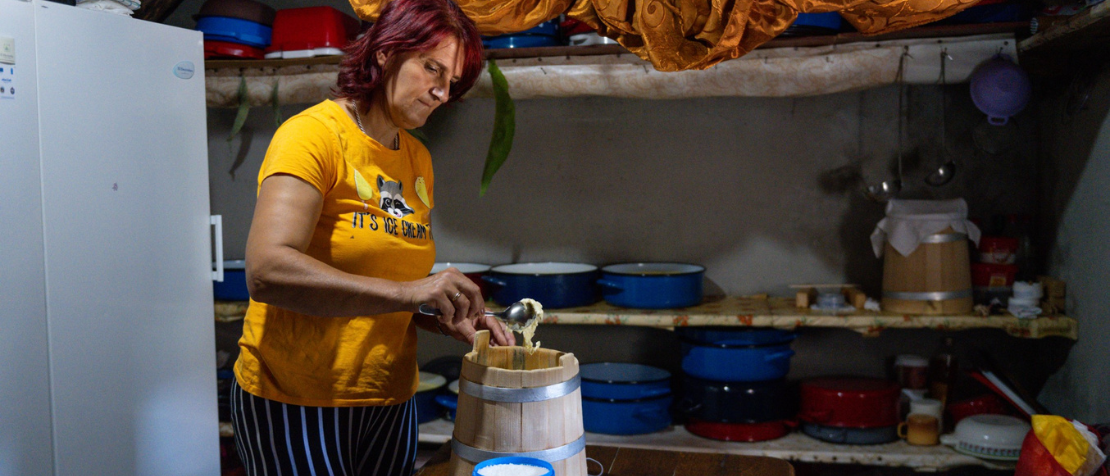Women behind push for resilience Bosnia and Herzegovinian agriculture
Rural should not be associated with underdevelopment, but signify an opportunity for empowering, for growth and development

©FAO/Imrana Kapetanovic
The agricultural sector in Bosnia and Herzegovina faces significant gender disparities. Women account for nearly half (49 percent) of the rural population and 20 percent of employed women work in the agriculture sector, yet only 18 percent of farms are managed by women and only 38 percent of women own or have part-ownership of agricultural land. Women’s participation does not give them agency, decision-making authority, and equal voices with men. They face systemic barriers to resources and leadership opportunities.
Strengthening capacities of women from rural areas in Bosnia and Herzegovina and supporting agriculture and rural development policies with an emphasis on gender equality are among the main goals of the project "Women Driving Resilience in Agriculture and Rural Areas," implemented by the Food and Agriculture Organization of the United Nations (FAO) and UN Women and financed by Sweden.
This joint project focuses on dismantling the structural barriers that women in rural areas face. By introducing solutions that streamline their work and provide innovative financing solutions, the initiative aims to empower these women. Training will equip them with the skills to navigate the unique challenges of agricultural business, ultimately enhancing living standards and improving the socio-economic status of families in rural communities. This holistic approach not only fosters individual growth but also contributes to broader community development.
Learning from past achievements, the project engages successful women. “It is very important that our work, women’s work, is recognized. Women are still the centre of families, and it is important for them to show their economic acumen and contribution to household budgets,” states Dragana Milovic, chairperson of Gatacki kajmak association, consisting of 26 women cream cheese producers. According to her, “this work makes women visible and a force to reckoned with. It gives us a voice.”
Dragana, an agricultural engineer by profession, takes great pride in her association's achievements. In just three years, women successfully registered the organization and obtained Protected Designation of Origin (PDO) status. These milestones not only recognise the quality and uniqueness of their products but also enhance the association's credibility and marketability.
Obtaining the PDO status also means that all products must be made following the traditional procedures, some of which are undermined by the effects of climate change.
“We notice the impact of climate change. For example, draught and high temperatures, especially this year, are forcing us to be ever more innovative in maintaining the traditional production protocols. Lack of water has direct impact on decreasing the milk production and higher temperatures demand artificial cooling of production facilities, instead of air drying of cream cheese, required in traditional production,” explains Dragana.
Being heard demands a permanent seat at the table where the major decisions are made. FAO and UN Women are working to strengthen the capacities of women-farmers and producers to participate in all decisions on agricultural policies and budgetary programming. The project’s efforts are also focused on advocating for gender parity in managerial and decision-making positions in relevant ministries and institutions. As one of the solutions, changes in the strategic and legal framework are suggested according to which women farmers, who are not owners but are members of household farms have access to financial assistance funds. This would be a major step forward in ensuring that such household farms are viable and sustainable. Further efforts will be directed to assisting women farmers’ associations to establish a country-level organization, which will enable them to share assets, such as equipment, access wider markets and maybe most importantly – create a single platform on which they can articulate their demands and needs to authorities and institutions.
“Currently, we still have great energy to do even bigger things in the future, but we need authorities and society to pay more attention to our work, which will enable us to expand our production and further secure the future of all women active in agrifood production,” concludes Dragana.
Guidance and exchange of experiences among different women’s associations and unions is much needed and there are promising examples. According to Vlado Pijunovic, FAO National Project Coordinator, “there are some exceptionally well-organized associations who are doing great work. And it is important to support them so that they do not give up and stay determined to implement their plans. On the other hand, there are many women producers who still struggle to access markets or training, so the good experience of these associations serves as a stimulus for the formation of new ones.”
Within the project, FAO works with women in different value chains to help them come together to find solutions to common problems and challenges. The project is creating platforms where women producers and their organizations can lead discussions and share experiences.
“We have great communication channels with many associations of women in farming and other agrifood sectors. Their advice and directions were instrumental in our work, and we will do our outmost to continue supporting our efforts ensuring that women eventually take on leadership roles and contribute to sustainable agricultural practices, ultimately benefiting their communities and economies,” said Dragana.
